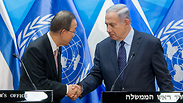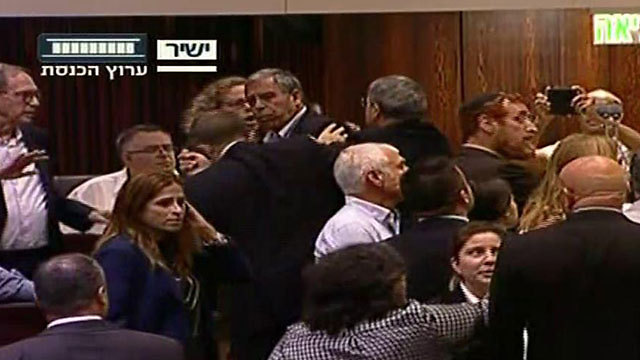
The PM needs to lead to reconciliation
צילום: יונתן זינדל / פלאש90
The war between us and ourselves
Op-ed: The reconciliation agreement with Turkey matters less than the more important—and more needed—reconciliation agreement with ourselves: Netanyahu must lead the nation to unity, and pot-stirring politicians need to cut it out.
Years of work, hundreds of documents exchanged, and Mossad chiefs shuffled: All these produced in the end a reconciliation agreement with Turkey. This reconciliation is important, but it's really not the most needed reconciliation here. We need a reconciliation that would cost the Israeli government a lot less and that would become a much more decisive factor in the fate of the country.
"What is she talking about?" you're assuredly saying to yourselves. Soon, we'll be packing our bags and flying to Erdoğan's clubs. So just before you hit the duty free, you should look directly at what is happening here in the interior. At the real war that should be comsuming our nights. The war between us and ourselves. The bubbling hatred, breaking all the codes, including the constant entry into the Israeli holy of holies: the IDF and the defense establishment.
This hatred doesn't come from anywhere. It's incessantly fueled by cynical politicians who have lost any sense of shame and smash whatever lays in their path on their way to another vote in the upcoming primaries. The hate train is speeding ahead, and it only stops to refuel with the politician on duty.
In the beginning of the 2000s, we were struck by war. It wasn't a war of days and months. For more than four years, buses exploded, cafés became death traps, and kamikaze terrorists struck us on a nearly daily basis, eliminating entire families.
The country was full of blood and tears. The last year is barely the little sister of that war. Stabbing attacks, though they do claim victims, and occasionally a slightly larger and more sophisticated attack. And it's precisely for this war that we were so unprepared. It's faced with these Facebook terrorists that we're so weak. It's here, when we're not faced with an existential threat, when our day-to-day life is nearly unhindered, that a large fracture is spreading. The fracture between us and ourselves. This is what most threatens our existence.
It's this fissure that the politicians make sure to preserve in the best case and to widen in the worse. We've never had such an embroiled, factious leadership like we do now, and I don't mean just those who are holding onto power.
Take for example what happened after the terrorist attack at the Sarona Market: If only one could say that those celebrating afterwards on Facebook were a mere handful. The persons—yes, the Jews—who welcomed the attack in Tel Aviv "because that's how leftists should die" are the ripe fruits of the seeds sown here in recent years. Those who dedicated their place in politics to cynically sow strife and vilify just for another place in the primaries.
It's no longer "The left has forgotten what it means to be Jewish," famously whispered by Netanyahu to Rabbi Kaduri in 1997; it's a competition amongst politicians on who is more belligerent, who will create more conflict, who is sacrificing the left more to a status of traitors who must be punished.
Netanyahu has declared more than once his commitment to the peace process. He would do well to force himself to start with less complicated, but considerably more important peace process: that between us and ourselves. The process in which we don't attack the deputy chief of staff, don't embrace the shooting soldier, don't stop funding theaters whose worldview don't gel with that of the minister of culture, and definitely, definitely don't sow the seeds that will flower into Facebook celebrations at the next terrorist attack in Tel Aviv.
With the unequivocal mandate that Netanyahu received in the last election, this should be his principal task. It's called "stateliness"—or, if you prefer: "everyone's prime minister." That which silences the voices of hate and puts a comforting hand on the back of a divided nation. A dad. If he takes this route, he's likely to find that it's more lucrative at the ballot box.











